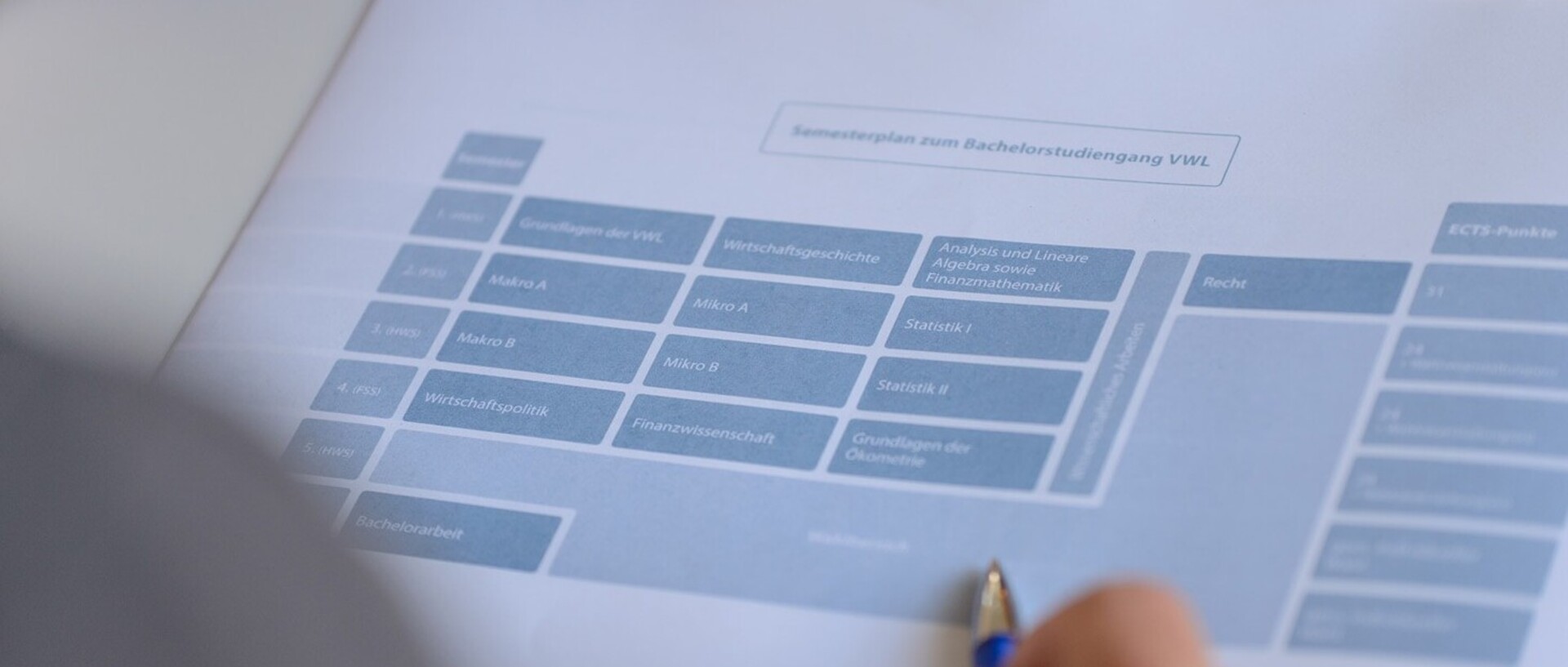Structure of the Bachelor’s Program
The bachelor’s degree in Economics at the University of Mannheim consists of an introductory phase followed by an advanced phase. The introductory phase lasts for four semesters, and forms the basis of the program.
In semesters five and six, the advanced phase of the program, students are generally free to choose which modules they take. To broaden their knowledge of specific topics from the field of Economics, students can attend a wide range of courses in Mannheim and also Heidelberg. Alternatively, they can spend a semester studying Economics at a university abroad. By studying subjects from other fields as minors, students can tailor their studies to their interdisciplinary interests. The following subjects can be taken as a minor in combination with Economics: Mathematics, Business Administration, Business Informatics, Philosophy, Law, Psychology, Political Science and Sociology. Some of these minors have to be studied from semester one onwards. Students can try out modules in minor subjects before officially making their decision.
Examinations and ECTS Credits
Each course concludes with an examination that takes place at the end of the semester. In seminars, students have to write a term paper and give a presentation. When students successfully complete a course, they are awarded credits in line with the European Course Credit Transfer System (ECTS). The number of credits given depends on the workload required to pass the course. This credit system is used across Europe which means that it is easier for the University of Mannheim to recognize credits obtained during a period of study at a European higher education institution and vice versa. Towards the end of the program, students are given eight weeks to write a bachelor's thesis.
Over the course of the whole bachelor’s program, between 180 and 188 ECTS credits are obtained. Students should complete modules worth approximately 30 ECTS credits per semester, depending on their subject combination.
The document containing the examination regulations is one of the most important documents for students as it contains all provisions and rules relating to the bachelor’s program in Economics. You can find the examination regulations and further comments on the Department’s website. The current, original version of the examination regulations is also available on the Student Services’ website.
Introductory Phase
The following modules are completed during the introductory phase:
- Principles of Economics
- Economic History
- Analysis and Linear Algebra A (Information on the requirements as well as on the refresher course in mathematics can be found here)
- Financial Mathematics
- Civil and Commercial Law
- Macroeconomics A
- Microeconomics A
- Statistics I
- Macroeconomics B
- Microeconomics B
- Statistics II
- Economic Policy
- Public Finance
- Basics of Econometrics
- Academic Writing Skills
The program schedule included in subject-specific attachment 1 of the examination regulations for the bachelor’s program in Economics highlights the semester in which students usually complete each module.
You can read about the content of each course in the course catalog. The module catalog also contains additional information on each of the modules available.
Advanced Phase
The advanced phase of the program consists of modules in Economics, modules in minor subjects, if studied, and the bachelor’s thesis. You can generally decide which modules you want to study during this phase, which means you can tailor your degree to your interests and career ambitions.
Excluding the bachelor's thesis, students are required to obtain between 65 and 73 ECTS credits during the advanced phase of the program, of which up to 48 ECTS credits may be gained from modules in minor subjects. Students must complete at least one seminar in Economics, but it is possible to attend up to three such seminars. If you don’t study Mathematics as a minor subject, you must either complete the module entitled International Economics, or one or two module(s) on a topic relating to Business Administration which is/
are worth at least six ECTS credits. You must attend a consultation to discuss your module choice and your goals. Usually, these consultations take place with either a (junior) professor, or senior academic staff member (Privatdozent).
Elective Modules in Economics
The Department of Economics in Mannheim is unrivaled in Germany when it comes to the number of modules on offer in the bachelor’s program, and the opportunities given to students to tailor their degree program to their interests. Taking a glance at the module catalog shows how diverse a bachelor's program in Economics at the University of Mannheim can be.
Economics students in their third year can also attend modules in Economics from the B.Sc. Economics program at Heidelberg University thanks to a cooperation agreement which is in place.
Interdisciplinary Elective Modules and Minors
During the advanced phase of the program, you can choose to only study modules available at the Department of Economics (including Economic History, Statistics, and Econometrics).
Alternatively, you can choose different interdisciplinary focuses by attending modules from one, or several, of the available minor subjects: Mathematics, Law, Business Administration, Business Informatics, Philosophy, Sociology, Political Science, and Psychology.
Key Competences
Key competences are becoming more and more important on the labor market. They are also an important aspect of the bachelor's program in Economics, and as such, are taught to students during the program’s subject-specific modules. In addition to this, students can obtain up to eight ECTS credits from courses that have a special focus on key competences. Students can attend these courses from the second semester onwards. Further information can be found here.
Bachelor’s Thesis
Towards the end of the third year, students write a bachelor’s thesis and, where required, attend a bachelor’s seminar. The thesis demonstrates that you can work independently on a topic and apply scientific methods. You can write your thesis on a topic from one of the following areas:
- Economics
- Statistics
- Econometrics
- Economic History
In certain circumstances, it is also possible to write your thesis in one of these areas at Heidelberg University. With the approval of the relevant area representative, you can also write your thesis on a topic relating to Mathematics, Business Informatics or Philosophy. However, to do this, you must have selected the subject as a minor (see above). You have ten weeks to complete your thesis, which is worth 12 ECTS credits.


